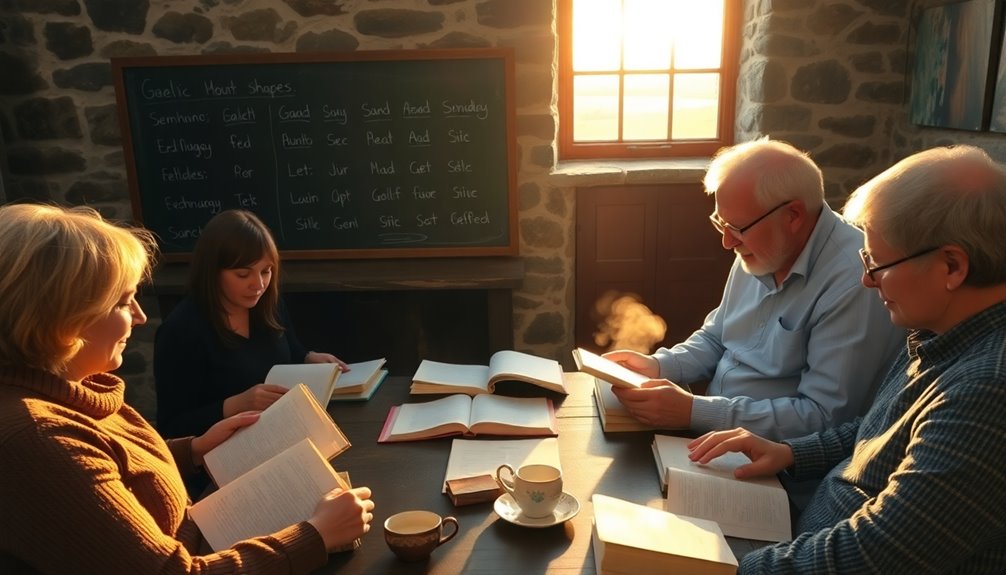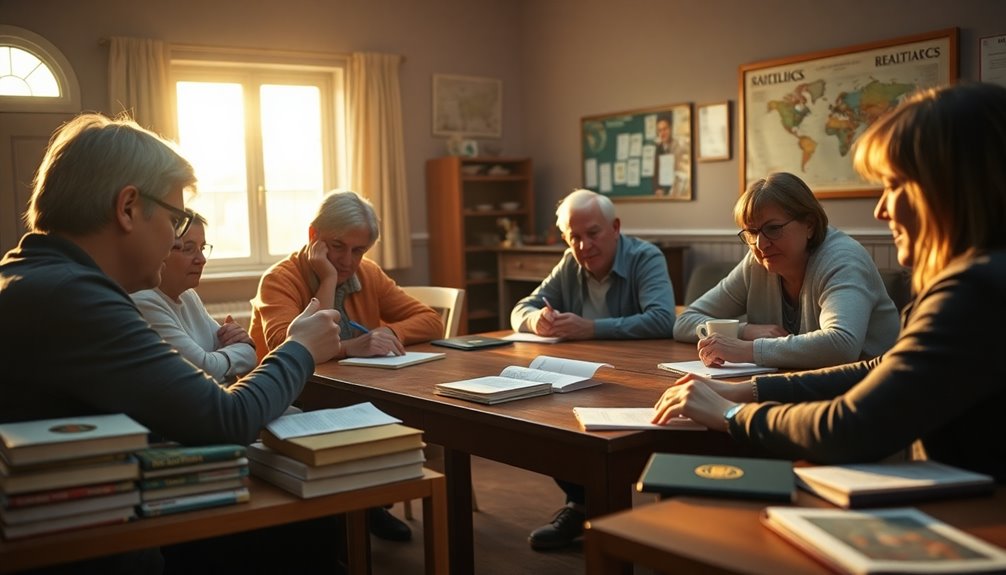
Join Gaelic workshops and you’ll sharpen English confidence fast; they give a supportive space to try new phrases, make mistakes, and get gentle correction. Interactive activities and cultural storytelling boost listening, clarity, and adaptability—skills employers love. You’ll meet mentors and peers who expand your network and can vouch for your communication. Short, documented classes also help show practical learning hours for work-study or visas. Keep going and you’ll find concrete ways these courses map onto career goals.
How Gaelic Workshops Boost Language Confidence for International Students
When you step into a Gaelic workshop, you’ll find a supportive space where making mistakes is part of learning rather than something to fear; instructors and peers encourage practice through interactive activities, role-play, and gentle correction. You’ll immerse yourself in language immersion that feels freeing — you’re encouraged to experiment, speak boldly, and let curiosity lead. Short, focused exercises build practical phrases you’ll actually use, so progress is visible and motivating. That steady practice fuels confidence building: each successful exchange reduces hesitation and opens social opportunities across campus and town. You’ll leave sessions able to express yourself more naturally, with less self-doubt and more willingness to take linguistic risks, embracing both Gaelic and your own growing voice.
Leveraging Cultural Classes to Strengthen CVs and Interview Skills
When you take Gaelic cultural classes, you’ll gain transferable communication skills that stand out on your CV. You’ll also show employers cultural adaptability and the ability to work with diverse teams. Plus, workshops are a great place to network and collect references that strengthen interview credibility.
Transferable Communication Skills
Although you might enroll in Gaelic workshops to learn the language and culture, they also sharpen communication skills employers value—clear storytelling, active listening, and adapting messages for different audiences. You’ll thrive in language immersion settings that force you to narrate ideas concisely, listen for nuance, and respond with confidence. That practice becomes tangible skill development you can list on your CV: concise verbal summaries, cross-cultural explanations, and polished responses under pressure. In interviews, you’ll draw on real examples of explaining concepts to varied groups, handling misunderstandings calmly, and tailoring tone to context. If you want professional freedom, these transferable communication abilities let you pivot roles, lead discussions, and negotiate with clarity—without losing the personal authenticity that makes you stand out.
Cultural Adaptability Boost
If you take cultural classes like Gaelic workshops, you’ll gain more than language — you’ll learn to read social cues, adapt your behavior to different norms, and present ideas in culturally aware ways that employers notice. You’ll show hiring managers you thrive in cultural exchange settings, that you can shift tone and approach depending on context, and that language immersion taught you patience and active listening. On your CV and in interviews, you can point to concrete examples: resolving misunderstandings, tailoring presentations for varied audiences, or integrating feedback from diverse peers. That signals flexibility and independence—qualities freedom-seeking professionals prize. Employers see a candidate who won’t just fit in, but who’ll help teams navigate cultural nuance and broaden their reach.
Networking Through Workshops
Because cultural workshops put you in close-knit learning environments, they’re prime places to build contacts who can vouch for your skills, share job leads, or collaborate on projects. You’ll develop community connections naturally while practicing language and culture, and those ties become tangible additions to your CV. Use class projects as portfolio pieces, ask peers for brief testimonials, and rehearse interview answers with supportive strangers who later become referees. This freedom-friendly approach turns personal interest into career capital without corporate constraints. Track outcomes, follow up on promising chats, and nurture professional relationships with low-pressure meetups. Below is a simple organizer to capture workshop benefits and next steps.
| Benefit | Action |
|---|---|
| Testimonial | Request short reference |
| Portfolio | Save class work |
| Lead | Note job contact |
| Follow-up | Schedule coffee |
Networking Opportunities Within Community Language Programs
When you join a Gaelic community program, you’re not just learning vocabulary and grammar—you’re plugging into a network of speakers, teachers, and cultural practitioners who can open doors to events, volunteering, and informal conversation groups. You’ll build community connections that let you practice language immersion in real settings, choosing how and when you engage. That freedom helps you craft a learning path tied to social life, not just textbooks.
- Meet mentors who guide local events and resources.
- Find peer groups that match your pace and interests.
- Access volunteer roles that deepen cultural understanding.
You’ll leave feeling empowered to use the language, expand your circle, and shape experiences that fit your need for autonomy.
Demonstrating Adaptability and Communication to Irish Employers

Showing adaptability and clear communication in Irish workplaces means proving you can handle changing priorities, work with diverse teams, and explain ideas concisely — all skills employers value as much as technical ability. You’ll show that by describing concrete moments from cultural immersion and language exchange where you pivoted fast, listened actively, and clarified goals. Say how you balanced local customs with project timelines, how you translated feedback between groups, and how you simplified complex points for non-specialists. Employers want people who take initiative without needing permission and who keep teams moving when plans shift. Frame your workshop experiences as evidence you’ll fit into flexible, collaborative environments, and you’ll signal both competence and the freedom to act decisively when circumstances demand it.
Using Workshop Experience to Meet Work-Study and Visa Requirements
If you need to meet work-study or visa conditions, draw a clear line from your Gaelic workshop activities to the specific requirements—hours logged, learning outcomes, and community engagement—and document them precisely. You’ll want to show how work study integration occurred: which tasks counted as practical hours, what skills were assessed, and how local projects satisfied visa compliance rules. Keep records, signed attendance sheets, and short reflective logs that tie each entry to regulations. Emphasize transferable skills without promising immigration outcomes. Use this simple checklist to stay organized:
- Record hours with supervisor signatures.
- Match workshop outcomes to official criteria.
- Collect community partner confirmations.
This keeps your freedom intact while meeting obligations, and makes verification straightforward.
Turning Short Courses Into Long-Term Career Advantages
Beyond meeting work-study or visa rules, you can turn short Gaelic workshops into lasting career assets by documenting skills, building networks, and creating tangible artifacts employers value. You’ll want to log competencies—communication, cultural literacy, creative problem-solving—and attach proof: recordings, lesson plans, translations, or project summaries. Convert casual contacts into mentors or collaborators; exchange LinkedIn endorsements and follow-up projects that show momentum. Package what you learned into brief case studies or a micro-portfolio that proves impact, not just attendance. Pitch these career benefits in interviews and on résumés, stressing adaptability and initiative. That way you keep mobility and independence while your short courses become clear signals of long-term professional growth, not temporary extracurriculars.
Some Questions Answered
Can Gaelic Workshops Improve My English Proficiency Indirectly?
Yes — like sunlight through stained glass, Gaelic workshops broaden your language learning and cultural immersion, so you’ll absorb nuances, boost listening and vocabulary indirectly, and gain the freedom to experiment confidently with English in real contexts.
Are Certificates From These Workshops Recognized by Employers?
Generally, you won’t find broad certificate recognition from Gaelic workshops; employer perception varies by industry and region. If you want freedom in career choices, highlight transferable skills and pair certificates with recognized qualifications to boost credibility.
Do Online Gaelic Classes Offer the Same Benefits as In-Person?
Yes — online Gaelic classes can offer similar benefits, but you’ll miss some in-person energy; online interaction and cultural immersion are possible through live sessions, virtual events, and resources, so you’ll still gain flexibility and meaningful practice.
Can Participation Affect My Visa Renewal or Immigration Points?
Yes — participation can matter: visa implications vary by program and hours, and you might gain immigration benefits if courses count toward language or community integration criteria. Check specific visa rules and document attendance carefully.
Will Employers View Gaelic Skills as Redundant if I Already Speak English?
No — employers won’t see Gaelic skills as redundant if you already speak English. Gaelic employment perceptions vary, but showing language skill relevance boosts your flexibility, cultural fit, and distinctiveness, which supports your freedom to choose roles.
